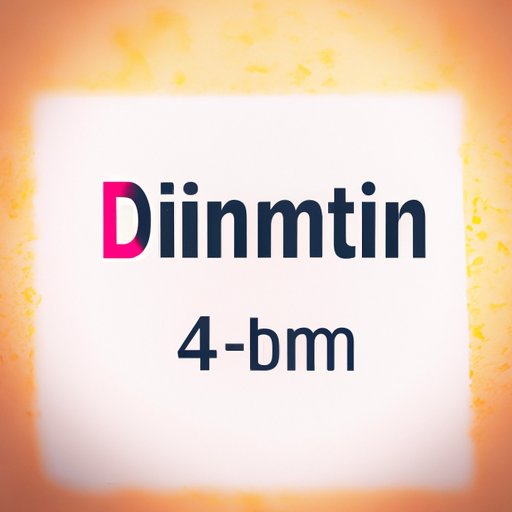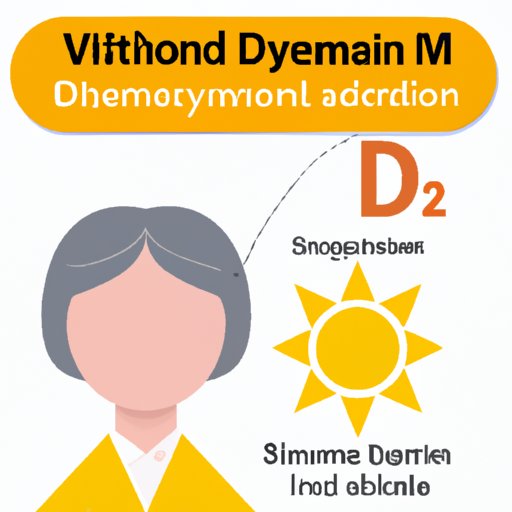
Does Vitamin D Increase Estrogen?
Vitamin D and estrogen are two essential compounds in the human body that play a crucial role in maintaining overall health and wellness. Vitamin D is responsible for strengthening bones, supporting the immune system, and maintaining balanced hormone levels, while estrogen is a hormone that regulates the menstrual cycle and impacts the reproductive system and other bodily functions.
In recent years, research studies have suggested that Vitamin D plays a crucial role in balancing estrogen levels in the body. This article will explore the link between Vitamin D and Estrogen and answer the question – Does Vitamin D Increase Estrogen?
Exploring the Link Between Vitamin D and Estrogen Levels
Before delving into the relationship between Vitamin D and Estrogen, let’s define these two essential compounds. Vitamin D is a fat-soluble vitamin that has hormone-like qualities and impacts multiple organ systems in the body. It is primarily synthesized in the body through sun exposure and is present in some foods and supplements. Estrogen, on the other hand, is a hormone mainly produced by ovaries in women. It is also present in smaller quantities in men and plays a vital role in the regulation of menstrual cycles, fertility, and bone health.
Common problems related to Vitamin D and Estrogen include infertility in women, menstrual cycle irregularities, osteoporosis, and low bone density. Lack of exposure to sunlight, poor dietary choices, and certain medications may lead to low levels of Vitamin D and Estrogen in the body.
The Role of Vitamin D in Boosting Estrogen Production
Research studies have shown that Vitamin D plays a key role in regulating estrogen levels in the body. Vitamin D stimulates the production of estrogen by supporting the enzymatic process that converts inactive estrogen precursors into biologically active estrogen. Vitamin D also helps to improve estrogen receptor expression in the body.
In addition, Vitamin D indirectly increases estrogen through modulating sex hormone-binding globulin (SHBG) levels. SHBG binds to sex hormones in the blood and reduces their biological availability. Vitamin D suppresses SHBG production in the liver, leading to an increase in circulating estrogen levels.
Ways to increase Vitamin D levels in the body include exposure to sunlight, consuming Vitamin D-rich foods such as fatty fish and fortified dairy products, and taking Vitamin D supplements. It is recommended to consume 600-800 IU of Vitamin D daily. However, this may vary depending on age, ethnicity, and exposure to sunlight.
A Comprehensive Guide to Understanding How Vitamin D Affects Estrogen Levels
The Science behind the relationship between Vitamin D and Estrogen is complex. It involves the Vitamin-D-responsive gene, CYP19, encoding aromatase, which is the enzyme responsible for converting androgen to estrogen. Studies have shown that the activity of the CYP19 gene is higher in the presence of Vitamin D, leading to increased estrogen levels in the body.
In addition, Vitamin D has an indirect effect on Estrogen levels. Studies have shown that Vitamin D stimulates the production of growth factors that help to maintain healthy tissues in the uterus and ovaries, leading to healthy estrogen levels in the body.
Can Increasing Vitamin D Intake Help Regulate Estrogen in Women?
Many studies have shown a positive correlation between Vitamin D and women’s health, including better estrogen regulation. In fact, a study conducted on women with polycystic ovary syndrome (PCOS) showed significant improvement in estrogen levels after taking Vitamin D supplements for 12 weeks.
Women can increase their Vitamin D levels through exposure to sunlight, consuming Vitamin D rich foods, and taking Vitamin D supplements. It is essential for women to maintain optimum Vitamin D levels for overall health and wellness.
The Correlation Between Vitamin D Deficiency and Low Estrogen Levels
Vitamin D deficiency can lead to multiple health problems, including low estrogen levels in the body. Symptoms of Vitamin D deficiency include fatigue, bone and muscle pain, and increased risk of bone fractures. In women, it may lead to menstrual irregularities and infertility.
Low estrogen levels in the body can lead to osteoporosis, hot flashes, night sweats, and vaginal dryness. It could also increase the risk of cardiovascular diseases, mood swings, and depression.

Why Vitamin D Is Important for Estrogen Balance in Men and Women
Maintaining balanced Vitamin D and Estrogen levels is essential for both men and women. Vitamin D is responsible for maintaining strong bones and healthy muscles in both genders. Estrogen helps regulate sexual function, bone density, and metabolism, among other functions.
In addition, Vitamin D plays a crucial role in hormone balance in men. Studies have shown that maintaining adequate levels of Vitamin D can help boost testosterone levels, leading to improved sexual function and overall health.
The Science behind Vitamin D’s Potential to Increase Estrogen Levels
Effective research studies have highlighted that Vitamin D can increase estrogen levels in the body. One study on postmenopausal women showed that high levels of Vitamin D intake led to an increase in estrogen levels. Another study conducted on premenopausal women with Vitamin D deficiency showed a significant improvement in estrogen levels after taking Vitamin D supplements for six months.
Regular intake of Vitamin D can also help to prevent estrogen deficiency in menopausal women leading to less severe symptoms such as hot flushes and difficulty sleeping
Conclusion
Vitamin D plays a crucial role in regulating estrogen levels in the body. Studies have shown that higher Vitamin D levels can lead to increased estrogen production, healthy sexual function, and overall wellness. To ensure optimal Vitamin D intake, it is important to expose oneself to sunlight, eat Vitamin D-rich foods, and take Vitamin D supplements.
It is recommended to consult a healthcare professional before taking any Vitamin D supplements to determine the appropriate dosage and avoid any potential side effects. Maintaining a balanced diet and regular exercise regimen can also help to boost Vitamin D and Estrogen levels in the body.
Final Thoughts and Recommendations
Vitamin D and Estrogen play vital roles in maintaining overall health and wellness. The link between Vitamin D and Estrogen highlights the importance of maintaining a healthy lifestyle, including proper sun exposure, a balanced diet, and exercise.
Women, in particular, should consider taking Vitamin D supplements to regulate estrogen levels naturally. Men can also benefit from regular Vitamin D intake to maintain overall hormonal balance.
Maintaining optimal Vitamin D and Estrogen levels is essential for overall health, wellness, and longevity.





